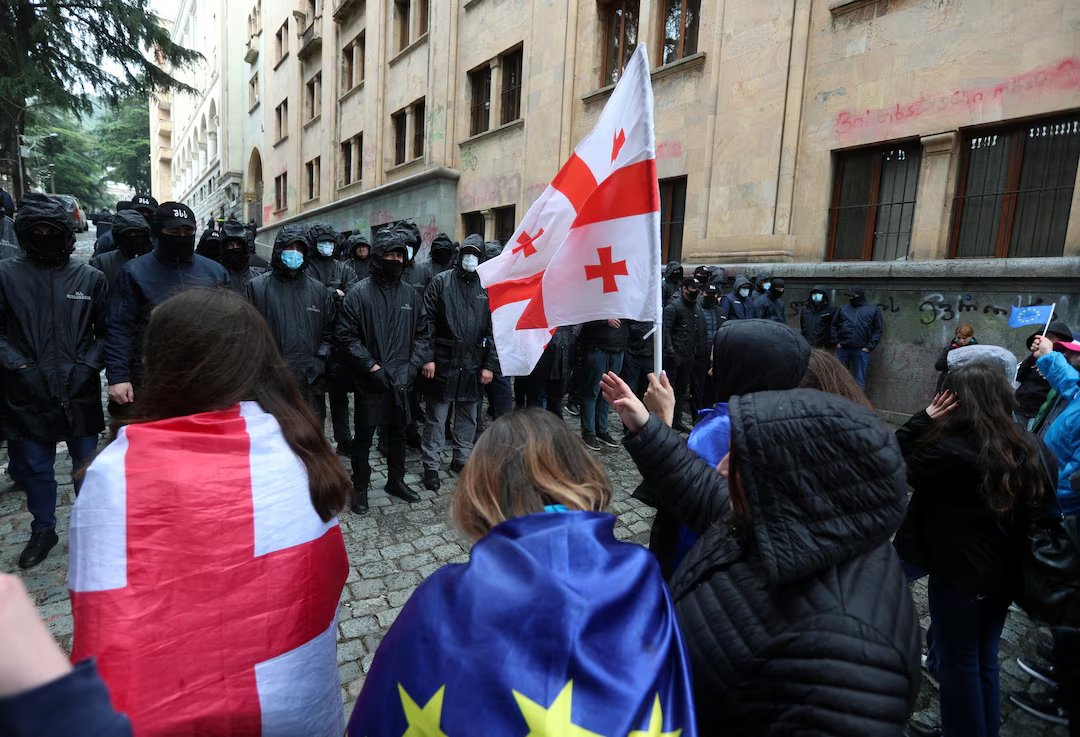Foreign agents and Orthodoxy, Georgia's identity
In Tbilisi, the leaders of the ruling Georgian Dream party call the demonstrators 'radicals' and even 'Satanists'. The patriarchate openly supports the government, which is committed to fighting 'the imposition of foreign, unusual and dangerous ideologies on the country's population. But the archbishop of Dmanisi, Zenon Iaradžuli, has asked not to approve the law, which could also harm some Church-related NGOs.
Tbilisi (AsiaNews) - Beyond the political conflicts and demonstrations against the law on "foreign influences", in the days of Orthodox Easter the discussion on the identity of the Georgian people intensified, especially among young people, who are the most prompted by street protests.
On Prospekt Rustaveli, the central street of the capital Tbilisi, the processions of demonstrators met with the mass of people going to church, and in addition to the Orthodox faithful, the celebration of the Resurrection of Christ questioned many non-believers and non-practitioners, as well to members of Georgia's significant Muslim minority.
The leaders of the ruling Georgian Dream party define the demonstrators as "radicals" and even "satanists", or "propagandists of LGBT culture", people who "have lost all orientation in life". They are the kids who go around with earrings, tattoos and piercings, "detached from traditions" with their colored hair and cobwebs printed on their necks.
According to the government authorities, these young people "are being eradicated from the gruzinstvo", the "Georgian identity" which in the 19th century had been defined by the poet Ilja Čavčadadze with the triad "Homeland, Language and Faith", even if he himself later replaced "Faith ” with “History”, after the Ottoman Empire returned the Adžaria region to the Georgian governorate of Tsarist Russia, with a predominantly Muslim population.
The role of the Orthodox Church, however, remains pre-eminent in the popular consciousness of Georgians, so much so that it is even written into the country's constitution, and still today supports the prevalence of the "patriotic triad" over any other orientation of politics and social life.
Unlike Armenia, which broke away from the dependence of the patriarchate of Constantinople in ancient dogmatic disputes, Georgia has always remained faithful to Byzantine Orthodoxy, which has allowed it to remain in a relationship of great assonance even with the domination of tsarism Russian.
From many declarations of these Easter days, starting with those of the president of parliament Šalva Papuašvili, "one cannot be Georgian without being Orthodox", moreover faithful practitioners of the patriarchal Church led by Ilja II, a great supporter of the patriotic cause.
On the occasion of the approval of the law on "foreign influences", the Church published a text in which it states that it "supports the desires of the people and politicians to integrate into Europe", but at the same time "we cannot remain silent about campaign to discredit the national Church, conducted by non-governmental organizations and television channels financed from abroad, in parallel with the growth of propaganda of the sinful life model of LGBT tendencies", which is why the law appears to ecclesiastics to be absolutely necessary.
The patriarchy openly supports the Georgian Dream government, committed to fighting "the imposition on the country's population of foreign, unusual and dangerous ideologies, which increase polarization among citizens... we do not need help in ideological issues, and the Our state authorities act firmly in the defense of our traditional values", reads the statement.
For many critics, the text released by the Church intends to divert attention from the statement released a few days ago by the archbishop of Dmanisi, Zenon Iaradžuli, who had asked not to approve the law as it could also damage some NGOs linked to the Church, creating the risk of an “institutional stigmatization of Georgian Orthodoxy”.
In particular, Zenon indicated the danger of favoring widespread positions "in the sovereign territories of Georgia occupied by Russia", referring to Abkhazia and South Ossetia, touching another very sore point in Georgian politics.
In an attempt to calm the parties in conflict, the bishop and patriarchal lieutenant Šjo Mudžuri called for "transferring street debates to the negotiating table, to find peaceful solutions", but the path to political, social and religious conciliation in Georgia appears still quite impervious.
07/02/2019 17:28







.png)











